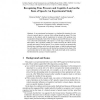Free Online Productivity Tools
i2Speak
i2Symbol
i2OCR
iTex2Img
iWeb2Print
iWeb2Shot
i2Type
iPdf2Split
iPdf2Merge
i2Bopomofo
i2Arabic
i2Style
i2Image
i2PDF
iLatex2Rtf
Sci2ools
117
click to vote
UM
2001
Springer
2001
Springer
Recognizing Time Pressure and Cognitive Load on the Basis of Speech: An Experimental Study
In an experimental environment, we simulated the situation of a user who gives speech input to a system while walking through an airport. The time pressure on the subjects and the requirement to navigate while speaking were manipulated orthogonally. Each of the 32 subjects generated 80 utterances, which were coded semi-automatically with respect to a wide range of features, such as filled pauses. The experiment yielded new results concerning the effects of time pressure and cognitive load on speech. To see whether a system can automatically identify these conditions on the basis of speech input, we had this task performed for each subject by a Bayesian network that had been learned on the basis of the experimental data for the other subjects. The results shed light on the conditions that determine the accuracy of such recognition. 1 Background and Issues This paper is an experimental follow-up to the UM99 paper by Berthold and Jameson ([2]). Those authors argued the following points, ...
| Added | 30 Jul 2010 |
| Updated | 30 Jul 2010 |
| Type | Conference |
| Year | 2001 |
| Where | UM |
| Authors | Christian A. Müller, Barbara Großmann-Hutter, Anthony Jameson, Ralf Rummer, Frank Wittig |
Comments (0)

